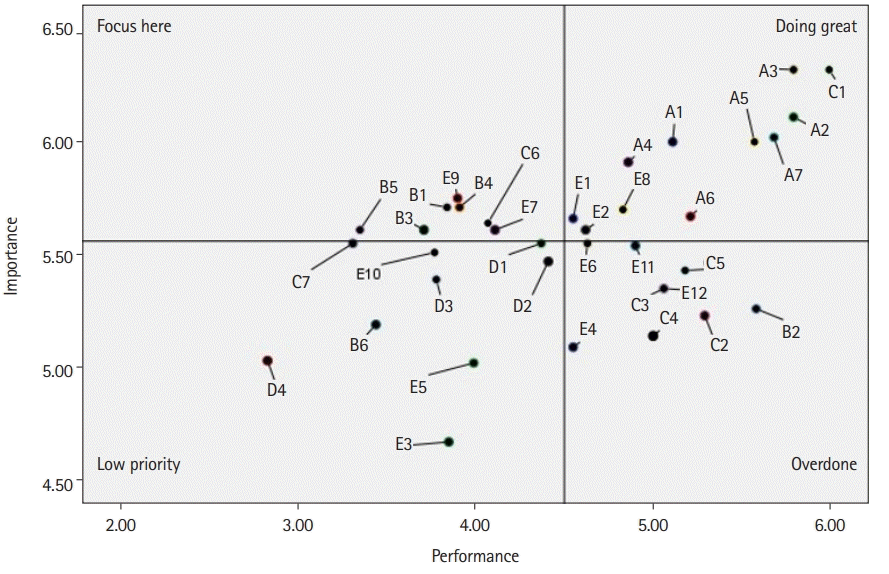Key results
This study aimed to identify the importance and performance of tasks among NSNs in Korea, and to find out the the important tasks to manage and suggest focus using the importance-performance analysis. The study showed there was a significant difference in all items between the importance and performance of NSNs’ tasks, with 5.56±0.78 and 4.50±1.06, respectively. An importance–performance analysis suggested NSNs perceived research and QI activities to be relatively insignificant and rarely performed and the most important NSNs’ tasks to focus on are “participation in nutrition care plan” and “reply the formal NST consultation”.
Interpretation
This study was conducted better to understand the importance and performance of NSNs’ tasks. This result indicated that NSNs perceived the importance more highly than the performance. It is necessary to analyze this result in light of work intensity or nurse staffing, which can cause differences in importance and performance. Moreover, it is required to develop strategies for reducing unnecessary tasks while increasing the performance of essential tasks.
An importance–performance analysis was used in this study to identify management strategies for the NSNs’ tasks. As a result, 11 items were confirmed to be the tasks that they perceived as important and could perform well at the same time, including “patient assessment: electronic medical record (EMR) review,” “participation in a nutrition care plan,” “evaluation of the nutrition care: EMR review,” “attending the NST round,” and “replying to the formal NST consultation.” Here, the NST’s activities are included as evaluation criteria in hospital health care accreditation, emphasizing the role and practice of NST members. In this regard, NSNs in NSTs appear to have perceived the importance of their tasks highly and exhibit high levels of performance accordingly. Additionally, nurses must complete a minimally-required nutrition education course to be approved for reimbursement for therapy NST [
3,
4], which includes the NST’s roles and the roles and tasks of each NST member. The participation of nurses in this education will provide them with an opportunity to recognize their roles and tasks as well as their performance. Unfortunately, compulsory education is only provided once, with no further education required. Therefore, advanced continuing education courses for NSNs are required.
Education, counseling/consultation, and participation in developing their processes and guidelines were identified as low-performance activities compared with their importance. Because education and counseling are independent and specialized tasks of NSNs that directly impact intensive nutrition support services, supportive measures are required to educate NSNs on the importance of their tasks and assist them in making time for education and counseling in the workplace. Moreover, because consultation activities are an important task for collaborations within a multidisciplinary team, it is necessary to provide specialized education to identify and improve the factors that disrupt the performance of consultation tasks.
Activities, such as preparing for education, announcing NST rounds and identifying their attendees, preparing NST meetings, announcing conferences and identifying their attendees, or completing various documents, showed higher levels of performance than their importance. This finding implies that NSNs performed liaison or trivial administrative tasks as high-frequency performance items by acting as a mediator in a multidisciplinary team. Tertiary hospitals, for example, allow NSNs to focus on their original roles by hiring administrative staff to assist with these tasks. Therefore, the placement of these administrative support personnel must be considered.
With the growing importance of nutritional support services in a clinical setting, the NST’s roles have greatly expanded. NSNs must have essential competencies to perform tasks, such as nutrition support nursing, consult, cooperation and coordination, research, and QI activities. Therefore, structured curriculums are urgently needed to develop these competencies. Moreover, as a motivational strategy, it is necessary to emphasize the importance of nutrition support nursing in clinical settings and provide information that allows NSNs to understand the nature of patients and their contribution.
Comparison with previous studies
In this study, NSNs perceived research and QI activities to be relatively insignificant and rarely performed. It is consistent with the findings of a study that examined the frequency of task performance among South Korean professional medical support staff, in which the staff showed the lowest performance [
15]. Low importance and performance areas denote low priority areas but should be gradually improved. Despite the high importance of studies and QI activities in ensuring patient safety and treatment quality [
9,
12], NSNs did not appear to recognize this importance. Emphasizing the importance of this task should come first. Additionally, participation in research is required to demonstrate the performance of nutritional support services, and hospitals should seek measures to improve NSN research competency.
Limitations and suggestions
This study targeted only nutrition support nurses who accessed an online survey, there is a limitation in generalizing these results to all nutrition support nurses. It only identified tasks based on perception by NSNs. In a further study, as a member of NST, a multidisciplinary team, it is necessary to consider the views of other members of the work performed by NSN.
Implications
The following task management strategies are proposed based on the above results. A system should be provided to assist NSNs in recognizing and performing the importance of education, counseling, and consultation, which were identified as areas for intensive improvement among NSNs’ tasks. It is also necessary to reduce NSNs’ repetitive and simple administrative tasks and find ways to provide administrative staff to improve their tasks. This study is significant in that it provides basic data for strategy planning by performing a comparative analysis of the importance and performance of NSNs’ tasks.





 PDF
PDF Citation
Citation Print
Print




 XML Download
XML Download